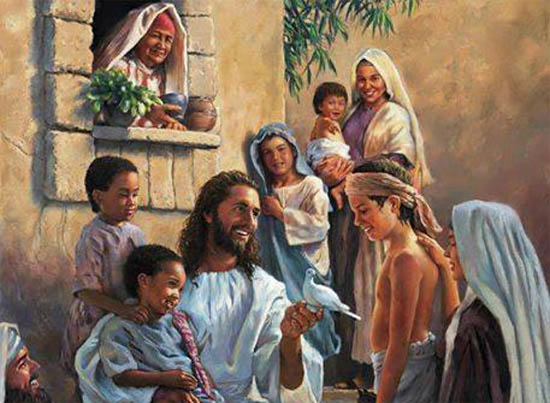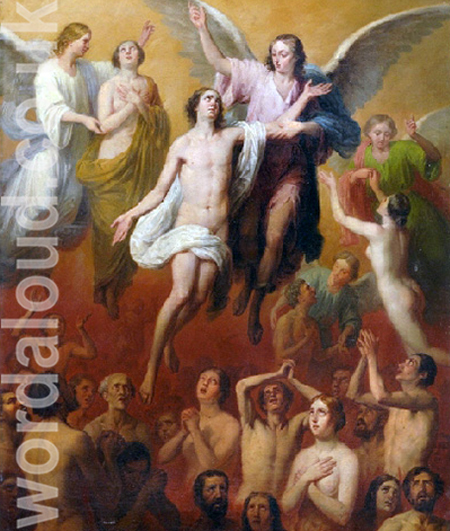Christian Art | Scribes And Pharisees | King James Audio Bible KJV
Luke 11: 47-54 – Week 28 Ordinary Time, Thursday (King James Audio Bible KJV, Spoken Verse)
47 Woe unto you! for ye build the sepulchres of the prophets, and your fathers killed them.
48 Truly ye bear witness that ye allow the deeds of your fathers: for they indeed killed them, and ye build their sepulchres.
49 Therefore also said the wisdom of God, I will send them prophets and apostles, and some of them they shall slay and persecute:
50 That the blood of all the prophets, which was shed from the foundation of the world, may be required of this generation;
51 From the blood of Abel unto the blood of Zacharias, which perished between the altar and the temple: verily I say unto you, It shall be required of this generation.
52 Woe unto you, lawyers! for ye have taken away the key of knowledge: ye entered not in yourselves, and them that were entering in ye hindered.
53 And as he said these things unto them, the scribes and the Pharisees began to urge him vehemently, and to provoke him to speak of many things:
54 Laying wait for him, and seeking to catch something out of his mouth, that they might accuse him.
Today’s Gospel verses again speak of the conflict between Jesus and the scribes and Pharisees, and again we sense the verses reflecting the breaking away of Christianity from Judaism, and the tensions in the aftermath of the fall of Jerusalem. Jesus’ rebuke of the scribes and Pharisees, the lawyers, is stinging. Jesus associates them with the history of murder of the righteous through Scripture, from the first murder of Abel to the murder of Zechariah, a prophet who died by stoning in Jerusalem around the year 800 BC because he accused the Jewish people of being unfaithful to God’s law (cf. 2 Chronicles 24: 20-22).
Jesus’ expression may seem strange as he speaks of those he accuses as building the tombs of those killed by their forefathers. The meaning seems to be that, by behaving in the way they do, the scribes and Pharisees implicitly approve of the murders, and indeed perhaps institutionalize them; they continue an unwholesome tradition of failing to see what is good, which is now Jesus, and sticking obstinately to what is evil. Were they freely as one with truth, they would recognize Jesus, as the one foretold through Scripture.
The scribes and Pharisees have, then, taken away the key of knowledge, refusing to enter into truth and also working to prevent others from doing so. While many flock to listen to Jesus, the scribes and Pharisees seek to turn the people away from Jesus. They seek to catch Jesus out, hoping that Jesus might say something they could use against him. The atmosphere of Luke’s Gospel is beginning to darken and become threatening.
Concluding prayer | Love Revealed By Jesus Christ
Grant us, Lord, a true knowledge of salvation,
so that, freed from fear and from the power of our foes,
we may serve you faithfully,
all the days of our life.
We make our prayer through our Lord.
![]()

King James Audio Bible | Endnotes
Old Testament Prophets | Isaiah
The book of Isaiah is a compilation of the writings of multiple authors over a period of time, spanning from the 8th to the 6th centuries BC. The prophet Isaiah himself was active during the reigns of four kings of Judah: Uzziah, Jotham, Ahaz and Hezekiah. However, the book also includes the works of other prophets and writers who lived before, during, and after Isaiah’s time. Essentially, Isaiah becomes a tradition – like a school – and so a history of writings bears the name.
Some scholars identify three distinct sections within the book: First Isaiah (chapters 1-39), Second Isaiah (chapters 40-55), and Third Isaiah (chapters 56-66).
First Isaiah is believed to have been written by the prophet Isaiah himself during the 8th Century BC. He lived during the reigns of King Uzziah, Jotham, Ahaz, and Hezekiah, and was called by God to prophesy to the people of Judah. Isaiah’s messages were directed primarily at the southern kingdom of Judah, warning them of impending destruction if they did not turn from their wicked ways and return to God.
Second Isaiah is believed to have been written during the Babylonian exile in the 6th Century BC, and was likely authored by several anonymous prophets. The messages of Second Isaiah are characterized by a message of hope and restoration, promising that God would bring the exiles back to their homeland and restore them to a position of prominence.
Third Isaiah is believed to have been written in the post-exilic period, after the return of the Jews to Jerusalem. The messages of Third Isaiah focus on rebuilding the Temple and restoring proper worship practices, as well as warning against social injustices and corruption.
The book of Isaiah has a clear message regarding the fate of the prophets. Throughout the book, the prophets are depicted as being persecuted, rejected, and even killed for their message. Isaiah himself experiences this fate, as he is believed to have been martyred during the reign of Manasseh, one of Judah’s most wicked kings.
Isaiah’s Warning Against Sin
Isaiah’s message was one of warning against Judah’s sin and disobedience to God. He spoke out against social injustice and religious corruption, calling for the people to turn back to God and repent. This message was not always well-received, and Isaiah faced opposition and rejection from his own people. In fact, in Isaiah 6:9-10, God tells Isaiah that the people will not listen to his message and that their hearts will be hardened.
The fate of the prophets in the book of Isaiah is not limited to Isaiah himself. The book also includes the story of Uriah, a prophet who spoke out against the wickedness of King Jehoiakim and was subsequently put to death (Jeremiah 26:20-23). Additionally, in Isaiah 53, there is a prophetic portrayal of a suffering servant who is rejected and despised by men, leading to his eventual death.
The book of Isaiah provides a powerful commentary on the fate of the prophets in the Old Testament. The book of Isaiah emphasizes persecution, rejection and martyrdom that many prophets faced for their message of warning and repentance.
Isaiah’s calling as a prophet is described in the first chapter of the book that bears his name. In a vision, Isaiah saw the Lord sitting on a throne, high and lifted up, and heard the angels singing: ‘Holy, holy, holy is the Lord Almighty.’ (Isaiah 6:1-3) Isaiah recognized his own sinfulness and unworthiness to be in the presence of God, but he was cleansed by a burning coal from the altar and commissioned to go and speak for God.
Calling Of The Prophet Isaiah And Message Of Hope
Isaiah’s message was one of warning against social injustice and religious corruption. Isaiah condemned the people of Judah for their idolatry, their oppression of the poor, and their empty rituals of worship. Isaiah called for repentance and urged the people to turn back to God.
Isaiah’s message of hope is not just a prediction of a future event, but a call to faith and obedience in the present. Isaiah challenges Israel’s leaders and people to turn away from their sins and return to God, who alone can save them. In Isaiah 1:16-17, the prophet exhorts:
‘Wash you, make you clean; put away the evil of your doings from before mine eyes; cease to do evil; Learn to do well; seek judgment, relieve the oppressed, judge the fatherless, plead for the widow.’
Isaiah’s message of hope and redemption is grounded in his vision of God’s holiness and righteousness. In Isaiah 6, the prophet has a vision of God’s glory and is overwhelmed by his own sinfulness. He cries out: ‘Woe is me! for I am undone; because I am a man of unclean lips, and I dwell in the midst of a people of unclean lips: for mine eyes have seen the King, the Lord of hosts.’ (Isaiah 6:5) This experience of encountering the holiness of God transforms Isaiah and shapes his prophetic ministry.
Isaiah’s prophetic message is also characterized by his denunciation of social injustice and religious corruption. He speaks out against the exploitation of the poor and the marginalized by the wealthy and powerful, and he condemns the false worship and idolatry that have infiltrated Israel’s religious practices. In Isaiah 5:7, he laments:
‘For the vineyard of the Lord of hosts is the house of Israel, and the men of Judah his pleasant plant: and he looked for judgment, but behold oppression; for righteousness, but behold a cry.’
Isaiah’s message of judgment is not intended to be punitive or vindictive, but to call Israel back to a right relationship with God. He sees God’s judgment as a means of purifying his people and preparing them for the coming of the Messiah.








